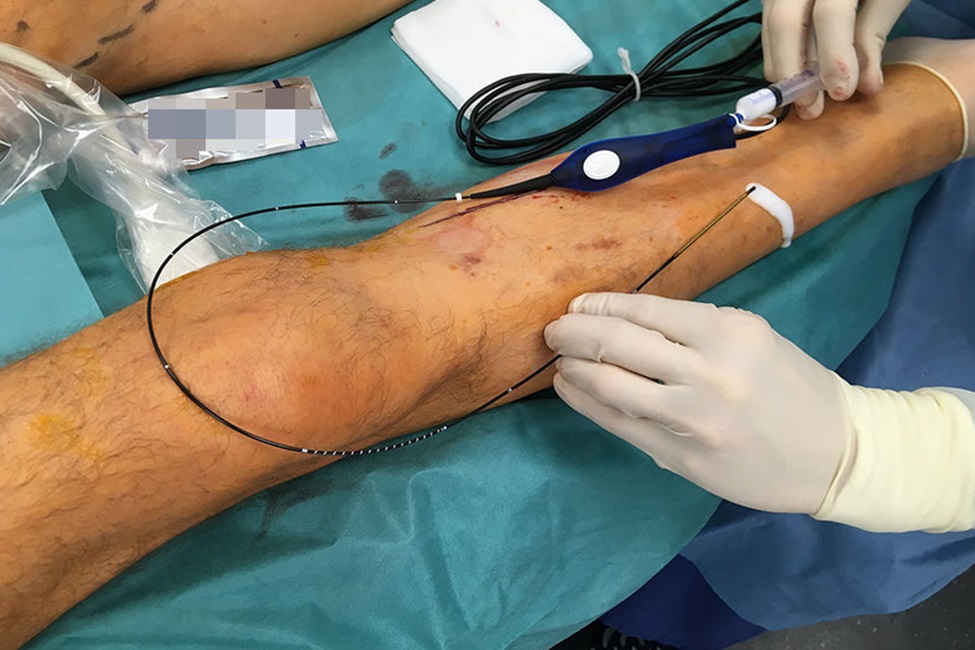Varicose veins and venous insufficiency can significantly impact an individual’s quality of life, causing discomfort, pain, and self-consciousness. Fortunately, advancements in medical technology have led to the development of minimally invasive treatments such as sclerotherapy ablation, offering new hope for patients seeking relief from vein-related issues. In this comprehensive guide, we’ll explore how sclerotherapy works, its benefits, and its potential to improve vein health and overall well-being.
Understanding Sclerotherapy Ablation
Sclerotherapy is a minimally invasive procedure used to treat varicose veins and chronic venous insufficiency by closing off diseased veins and redirecting blood flow to healthier vessels. During the procedure, a specially trained healthcare provider injects a sclerosing agent, typically a liquid or foam solution, directly into the affected vein using a fine needle. The sclerosing agent irritates the inner lining of the vein, causing it to collapse and seal shut. Over time, the closed vein is absorbed by the body, and blood flow is rerouted through nearby healthy veins, improving circulation and alleviating symptoms.
The Benefits of Sclerotherapy Ablation
Sclerotherapy offers several benefits for patients with varicose veins and venous insufficiency, making it an attractive treatment option for those seeking relief from vein-related symptoms. One of the primary advantages of sclerotherapy is its minimally invasive nature, which allows for faster recovery times, minimal scarring, and reduced risk of complications compared to traditional surgical procedures. Additionally, sclerotherapy is performed on an outpatient basis, meaning patients can return home the same day and resume their normal activities with minimal disruption to their daily routine.
Improving Vein Health and Functionality
Beyond symptom relief, sclerotherapy aims to improve vein health and functionality by eliminating diseased veins and restoring proper blood flow. Varicose veins and venous insufficiency occur when the valves within the veins fail to function correctly, leading to blood pooling, swelling, and discomfort. By closing off the affected veins, sclerotherapy helps redirect blood flow to healthier vessels, reducing pressure and congestion in the affected area. Over time, this promotes healing, reduces inflammation, and improves overall vein function, allowing patients to experience long-lasting relief from their symptoms.
Enhancing Cosmetic Appearance
In addition to its therapeutic benefits, sclerotherapy ablation can also enhance the cosmetic appearance of the legs by reducing the appearance of varicose veins and spider veins. Many patients with varicose veins feel self-conscious about the unsightly appearance of their legs, leading to feelings of embarrassment and low self-esteem. Sclerotherapy effectively removes or reduces the visibility of varicose veins, resulting in smoother, clearer skin and a more aesthetically pleasing appearance. This can boost patients’ confidence and self-image, allowing them to feel more comfortable and confident in their own skin.
Addressing Chronic Venous Insufficiency
Sclerotherapy is particularly effective for treating chronic venous insufficiency, a condition characterized by impaired blood flow in the veins, leading to symptoms such as leg swelling, pain, and skin changes. Left untreated, chronic venous insufficiency can progress to more severe complications, including venous ulcers and deep vein thrombosis. Sclerotherapy helps alleviate symptoms, improve blood flow, and prevent further complications by closing off diseased veins and restoring proper circulation. By addressing the underlying cause of venous insufficiency, ablation offers new hope for patients seeking relief from chronic leg discomfort and vascular issues.
Potential Risks and Considerations
While sclerotherapy is generally considered safe and effective, it’s essential to be aware of potential risks and considerations associated with the procedure. Like any medical intervention, sclerotherapy carries a small risk of complications, including allergic reactions to the sclerosing agent, skin discolouration bruising, and inflammation at the injection site. In rare cases, patients may experience blood clots, nerve damage, or infection following the procedure. Additionally, some individuals may not be suitable candidates for sclerotherapy, such as pregnant women, individuals with certain medical conditions, or those with a history of deep vein thrombosis. It’s crucial to discuss your medical history and any concerns with your healthcare provider to determine if sclerotherapy is the right treatment option for you.
Long-Term Results and Follow-Up Care
While sclerotherapy ablation can provide significant relief from varicose veins and venous insufficiency, it’s essential to understand that the results may vary from person to person, and additional treatments may be necessary to achieve optimal outcomes. Some patients may experience complete resolution of their symptoms after a single session of sclerotherapy, while others may require multiple treatments to achieve the desired results. Additionally, maintaining healthy lifestyle habits, such as regular exercise, maintaining a healthy weight, and wearing compression stockings, can help support long-term vein health and prevent recurrence of varicose veins. Follow-up appointments with your healthcare provider are essential to monitor your progress, address any concerns, and determine if additional treatments are needed to maintain the results of sclerotherapy.
Consultation with a Vein Specialist
If you’re considering sclerotherapy as a treatment option for varicose veins or venous insufficiency, it’s essential to consult with a qualified vein specialist who can assess your condition, discuss your treatment goals, and recommend the most appropriate course of action. A vein specialist will conduct a thorough evaluation of your veins, medical history, and symptoms to determine if sclerotherapy is suitable for your individual needs. They will explain the procedure in detail, discuss potential risks and benefits, and address any questions or concerns you may have. By partnering with a knowledgeable and experienced vein specialist, you can feel confident knowing that you’re receiving personalized care and guidance throughout your journey towards healthier veins and improved well-being.
Conclusion
Sclerotherapy ablation represents a significant advancement in the treatment of varicose veins and venous insufficiency, offering new hope for patients seeking relief from vein-related symptoms and complications. By closing off diseased veins and redirecting blood flow to healthier vessels, ablation promotes healing, improves vein function, and enhances overall well-being. With its minimally invasive nature, fast recovery times, and cosmetic benefits, ablation has become a preferred treatment option for patients looking to improve both the health and appearance of their legs. If you’re struggling with varicose veins or venous insufficiency, consult with a qualified vein specialist to determine if ablation is right for you and take a step towards healthier veins and a brighter future.





